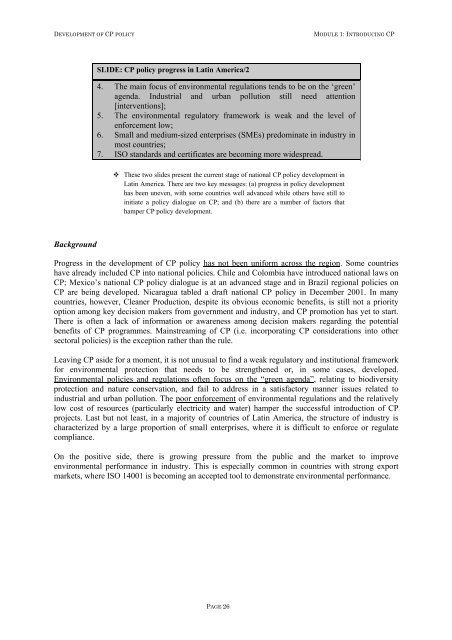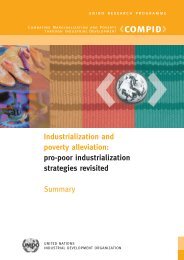Manual on the Development of Cleaner Production Policies ... - Unido
Manual on the Development of Cleaner Production Policies ... - Unido
Manual on the Development of Cleaner Production Policies ... - Unido
Create successful ePaper yourself
Turn your PDF publications into a flip-book with our unique Google optimized e-Paper software.
DEVELOPMENT OF CP POLICY<br />
MODULE 1: INTRODUCING CP<br />
SLIDE: CP policy progress in Latin America/2<br />
4. The main focus <strong>of</strong> envir<strong>on</strong>mental regulati<strong>on</strong>s tends to be <strong>on</strong> <strong>the</strong> ‘green’<br />
agenda. Industrial and urban polluti<strong>on</strong> still need attenti<strong>on</strong><br />
[interventi<strong>on</strong>s];<br />
5. The envir<strong>on</strong>mental regulatory framework is weak and <strong>the</strong> level <strong>of</strong><br />
enforcement low;<br />
6. Small and medium-sized enterprises (SMEs) predominate in industry in<br />
most countries;<br />
7. ISO standards and certificates are becoming more widespread.<br />
These two slides present <strong>the</strong> current stage <strong>of</strong> nati<strong>on</strong>al CP policy development in<br />
Latin America. There are two key messages: (a) progress in policy development<br />
has been uneven, with some countries well advanced while o<strong>the</strong>rs have still to<br />
initiate a policy dialogue <strong>on</strong> CP; and (b) <strong>the</strong>re are a number <strong>of</strong> factors that<br />
hamper CP policy development.<br />
Background<br />
Progress in <strong>the</strong> development <strong>of</strong> CP policy has not been uniform across <strong>the</strong> regi<strong>on</strong>. Some countries<br />
have already included CP into nati<strong>on</strong>al policies. Chile and Colombia have introduced nati<strong>on</strong>al laws <strong>on</strong><br />
CP; Mexico’s nati<strong>on</strong>al CP policy dialogue is at an advanced stage and in Brazil regi<strong>on</strong>al policies <strong>on</strong><br />
CP are being developed. Nicaragua tabled a draft nati<strong>on</strong>al CP policy in December 2001. In many<br />
countries, however, <strong>Cleaner</strong> Producti<strong>on</strong>, despite its obvious ec<strong>on</strong>omic benefits, is still not a priority<br />
opti<strong>on</strong> am<strong>on</strong>g key decisi<strong>on</strong> makers from government and industry, and CP promoti<strong>on</strong> has yet to start.<br />
There is <strong>of</strong>ten a lack <strong>of</strong> informati<strong>on</strong> or awareness am<strong>on</strong>g decisi<strong>on</strong> makers regarding <strong>the</strong> potential<br />
benefits <strong>of</strong> CP programmes. Mainstreaming <strong>of</strong> CP (i.e. incorporating CP c<strong>on</strong>siderati<strong>on</strong>s into o<strong>the</strong>r<br />
sectoral policies) is <strong>the</strong> excepti<strong>on</strong> ra<strong>the</strong>r than <strong>the</strong> rule.<br />
Leaving CP aside for a moment, it is not unusual to find a weak regulatory and instituti<strong>on</strong>al framework<br />
for envir<strong>on</strong>mental protecti<strong>on</strong> that needs to be streng<strong>the</strong>ned or, in some cases, developed.<br />
Envir<strong>on</strong>mental policies and regulati<strong>on</strong>s <strong>of</strong>ten focus <strong>on</strong> <strong>the</strong> “green agenda”, relating to biodiversity<br />
protecti<strong>on</strong> and nature c<strong>on</strong>servati<strong>on</strong>, and fail to address in a satisfactory manner issues related to<br />
industrial and urban polluti<strong>on</strong>. The poor enforcement <strong>of</strong> envir<strong>on</strong>mental regulati<strong>on</strong>s and <strong>the</strong> relatively<br />
low cost <strong>of</strong> resources (particularly electricity and water) hamper <strong>the</strong> successful introducti<strong>on</strong> <strong>of</strong> CP<br />
projects. Last but not least, in a majority <strong>of</strong> countries <strong>of</strong> Latin America, <strong>the</strong> structure <strong>of</strong> industry is<br />
characterized by a large proporti<strong>on</strong> <strong>of</strong> small enterprises, where it is difficult to enforce or regulate<br />
compliance.<br />
On <strong>the</strong> positive side, <strong>the</strong>re is growing pressure from <strong>the</strong> public and <strong>the</strong> market to improve<br />
envir<strong>on</strong>mental performance in industry. This is especially comm<strong>on</strong> in countries with str<strong>on</strong>g export<br />
markets, where ISO 14001 is becoming an accepted tool to dem<strong>on</strong>strate envir<strong>on</strong>mental performance.<br />
PAGE 26
















